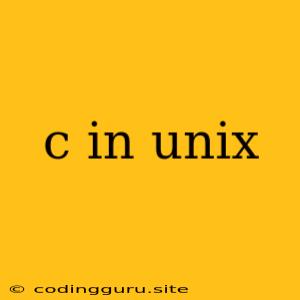Understanding C Programming in Unix Systems
The C programming language is a foundational pillar of Unix systems. Its role extends far beyond just writing applications. C is deeply intertwined with the operating system itself, being used to develop its core components. Understanding C in the context of Unix is crucial for anyone wanting to delve into the inner workings of this powerful operating system.
Why is C so important for Unix?
- Foundation of Unix: The Unix operating system was written primarily in C. This makes C the language closest to the operating system's core functionality, providing unparalleled control and efficiency.
- System Programming: C is ideal for system programming, allowing developers to work directly with system resources like memory, processes, and file systems. This makes it perfect for building system utilities, device drivers, and other low-level components.
- Portability: Unix systems are known for their portability across different hardware platforms. C's nature as a relatively low-level language, combined with its standard library, makes it highly portable and adaptable to various architectures.
- Performance: C is renowned for its performance, being a compiled language that translates directly into machine instructions. This efficiency makes it a preferred choice for system programming where resource optimization is critical.
Essential Concepts for C Programming in Unix
- Standard Input/Output (I/O): C's standard I/O library is essential for interacting with the Unix environment. You'll use functions like
printf(),scanf(),fopen(), andfclose()to manipulate data streams. - System Calls: These are the heart of interaction between your C program and the Unix kernel. Functions like
fork(),exec(),open(), andread()provide direct access to system resources. - File System Access: Understanding how to manipulate files and directories in Unix is crucial. C provides functions like
mkdir(),rmdir(),opendir(), andreaddir()for these operations. - Signal Handling: C allows you to handle signals, which are asynchronous events generated by the operating system. This is important for making your programs robust and responsive to external events.
- Process Management: C offers functions like
fork()andexec()to create and manage child processes. This is fundamental for developing multi-threaded applications and complex system programs.
Learning Resources
- The C Programming Language (K&R): This classic book provides a comprehensive introduction to C and is an excellent starting point for learning.
- Unix System Programming (Stevens): This book delves deeper into the core concepts of Unix system programming, including system calls and file system management.
- Online Tutorials and Documentation: Numerous online resources offer free tutorials, documentation, and code examples to assist your learning journey.
Examples of C Programs in Unix
Here's a simple C program to illustrate the use of standard I/O and system calls in a Unix environment:
#include
#include
int main() {
// Print a message to the standard output (terminal)
printf("Hello from C in Unix!\n");
// Create a child process
pid_t pid = fork();
if (pid == 0) {
// Child process: Execute the 'ls' command
execlp("ls", "ls", "-l", NULL);
} else if (pid > 0) {
// Parent process: Wait for the child process to finish
wait(NULL);
printf("Child process completed.\n");
} else {
// Error in fork()
perror("fork");
}
return 0;
}
Conclusion
C is an indispensable language for working with Unix systems. Its low-level capabilities, combined with the power of the Unix environment, open a world of possibilities for developers. By mastering C programming in Unix, you can gain a deep understanding of how the operating system works and develop sophisticated applications and system utilities. This journey requires dedication and a solid grasp of core concepts, but the rewards in terms of knowledge and skill are substantial.
